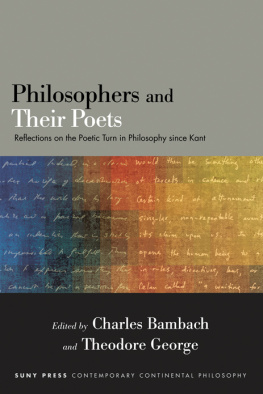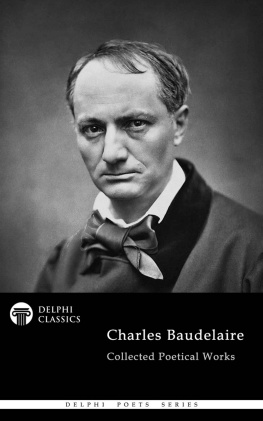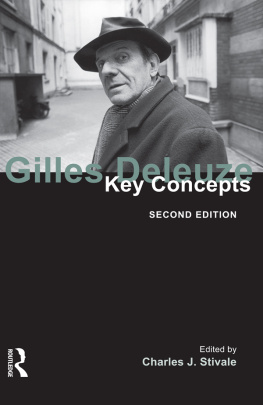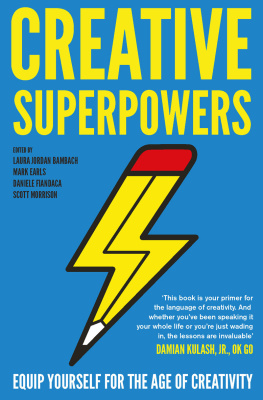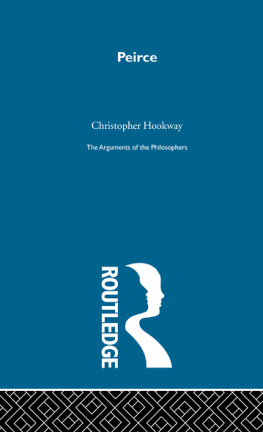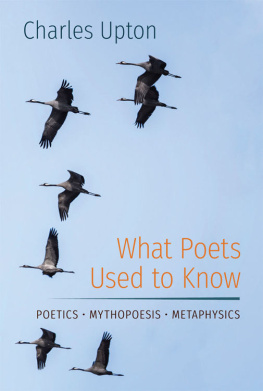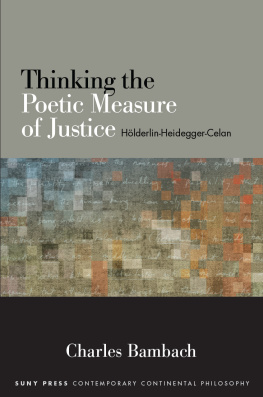Charles Bambach - Philosophers and Their Poets
Here you can read online Charles Bambach - Philosophers and Their Poets full text of the book (entire story) in english for free. Download pdf and epub, get meaning, cover and reviews about this ebook. year: 2019, publisher: State University of New York Press, genre: Religion. Description of the work, (preface) as well as reviews are available. Best literature library LitArk.com created for fans of good reading and offers a wide selection of genres:
Romance novel
Science fiction
Adventure
Detective
Science
History
Home and family
Prose
Art
Politics
Computer
Non-fiction
Religion
Business
Children
Humor
Choose a favorite category and find really read worthwhile books. Enjoy immersion in the world of imagination, feel the emotions of the characters or learn something new for yourself, make an fascinating discovery.
- Book:Philosophers and Their Poets
- Author:
- Publisher:State University of New York Press
- Genre:
- Year:2019
- Rating:3 / 5
- Favourites:Add to favourites
- Your mark:
- 60
- 1
- 2
- 3
- 4
- 5
Philosophers and Their Poets: summary, description and annotation
We offer to read an annotation, description, summary or preface (depends on what the author of the book "Philosophers and Their Poets" wrote himself). If you haven't found the necessary information about the book — write in the comments, we will try to find it.
Philosophers and Their Poets — read online for free the complete book (whole text) full work
Below is the text of the book, divided by pages. System saving the place of the last page read, allows you to conveniently read the book "Philosophers and Their Poets" online for free, without having to search again every time where you left off. Put a bookmark, and you can go to the page where you finished reading at any time.
Font size:
Interval:
Bookmark:

Philosophers and Their Poets
SUNY series in Contemporary Continental Philosophy
Dennis J. Schmidt, editor
Philosophers and Their Poets
Reflections on the Poetic Turn in Philosophy since Kant
Edited by
Charles Bambach and Theodore George

Published by State University of New York Press, Albany
2019 State University of New York
All rights reserved
Printed in the United States of America
No part of this book may be used or reproduced in any manner whatsoever without written permission. No part of this book may be stored in a retrieval system or transmitted in any form or by any means including electronic, electrostatic, magnetic tape, mechanical, photocopying, recording, or otherwise without the prior permission in writing of the publisher.
For information, contact State University of New York Press, Albany, NY
www.sunypress.edu
Library of Congress Cataloging-in-Publication Data
Names: Bambach, Charles and Theodore George, editors.
Title: Philosophers and Their Poets: Reflections on the Poetic Turn in Philosophy since Kant / Charles Bambach and Theodore George, editors.
Description: Albany : State University of New York Press, 2019. / Includes bibliographical references and index.
Identifiers: ISBN 9781438477039 (hardcover : alk. paper) / ISBN 9781438477046 (ebook)
Further information is available at the Library of Congress.
10 9 8 7 6 5 4 3 2 1
Contents
Charles Bambach and Theodore George
Mara del Rosario Acosta Lpez
Christopher Turner, translator
Theodore George
Babette Babich
Kalliopi Nikolopoulou
Charles Bambach
William McNeill
Krzysztof Ziarek
Gnter Figal
Gert-Jan van der Heiden
Max Kommerell, trans. Christopher D. Merwin and Margot Wielgus
Acknowledgments
, Mara Acosta, On the Poetical Nature of Philosophical Writing: A Controversy over Style between Schiller and Fichte. This is a revised version of an article originally published as part of a special issue on Friedrich Schiller edited by Laura Anna Macor for Philosophical Readings 5 (2013): 17293. I would like to thank Kevin Thompson and Rachel Zuckert for inviting me to discuss this paper in the context of Chicagos 2015 meeting of the German Philosophy Consortium. The comments and questions that came up during that session were essential for my revision and rewriting of this paper. I would also like to thank Christopher Eagle for being such a patient reader of several versions of this paper, and for helping me to produce a more refined account of my philosophical ideas as well as a better translation of this text into English. I also want to thank Colin McQuillan for copyediting the final version of this paper for publication in this volume.
, Fichte and Schiller Correspondence, from Fichtes Werke , Vol. 8 (De Gruyter), translated by Christopher Turner. The editors would like to thank the Glassock Center for Humanities Research at Texas A&M University for generous support of this translation.
, Babette Babich, Who Is Nietzsches Archilochus? Rhythm and the Problem of the Subject. This essay has been presented in Scarborough, Freiburg, and Copenhagen as well as Dallas, Texas. I am grateful, first and foremost to Christian Benne in addition to Anke Bennholdt-Thomsen who discussed some of these concepts with me, in addition to my gratitude to Andreas Urs Sommer. I am also grateful to Charles Bambach and Theodore George. A German version has been published as Nietzsches Lyrik. Archilochos, Musik, Metrik in Christian Benne and Claus Zittel, eds., Nietzsche und die Lyrik. Ein Kompendium (Frankfurt am Main: Springer, 2017), 40529.
, Max Kommerell, Hlderlins Empedocless Poems, from Spirit and Letter of Poetry , trans. Christopher Merwin and Margot Weiglus. The editors would like to thank the Glassock Center for Humanities Research at Texas A&M University for generous support of this translation.
Introduction
Poetizing and Thinking
C HARLES B AMBACH AND T HEODORE G EORGE
The very gesture of thinking, Plato tells us in Theatetus , finds its origin in the experience of wondering (). But if otherness belongs to such wonder, then we might also say that othernessin the sense of ineradicable alteritylikewise bears and thoroughly governs whatever philosophy might undertake. What is other belongs to philosophy as its and ruling origin, one that it does not, however, leave behind as it makes its way within the world. Rather, in recognizing what is other as intimately belonging to its origin, philosophy confronts otherness as having an essential relation to whatever constitutes its own and proper task. In this sense, philosophy not only requires its other in order to be itself, but it is precisely this relation to its other that allows philosophical questioning to attend to the questionability of all that is.
In this same Cerisy lecture about the sense and origin of philosophical thinkingand not by accidentHeidegger takes up the question about the relationship between thinking ( Denken) and its otherpoetizing ( Dichten ). He writes:
But since poetizing, when compared with thinking, stands in the service of language in a wholly other and exemplary way, our conversation, which thoughtfully pursues philosophy, is necessarily led to discuss the relation of thinking and poetizing. Between both, thinking and poetizing, there prevails a hidden affinity since in the service of language both use and squander language. At the same time, however, between both thinking and poetizing there subsists a chasmfor both dwell on mountains farthest apart.
To think the chasm between thinking and poetizing means that we attune ourselves to the disparateness that attends this separation. Here, poetizing confronts thinking as its other. And yet in coming to experience the separation between them, we cannot help but encounter a certain affinity between thinking and poetizing as well, an affinity that emerges in and through the chasm that divides them. As Heidegger expresses it, [W]hat is said in poetizing and what is said in thinking are never identical; but they are at times the samenamely, when the chasm between poetizing, and thinking gapes purely and decisively. Yet here we also come to see that poetizing makes communication ever more difficult, since its very manner of presenting words undermines their clarity and stability and renders them ever more obscure. In this way, we can perhaps find an echo of the original sense of the German term dichten (poetizing) with its roots in the adjective dicht . Poetry thickens language, making it dense and difficult to penetrate ( dicht machen ), sometimes closing off its meaning in dense clusters that become almost watertight ( dichthalten).
Yet at the same time poetry beckons us to tarry awhile amid its dense, impenetrable word clusters, offering its hospitality to those readers/listeners who are patient enough to attend to its playful commerce with
In his very first lecture course on Hlderlin from WS 1934/35, Heidegger finds a clue to the meaning of poetizing as a making manifest. Going back to the semantic field of the Old High German term tithon, which he traces back to the Latin word dicere, Heidegger maintains that dichten shares the same root as the Greek deiknymi . It means to show, to make something visible, to make it manifestnot just in general, but by way of a specific pointing.
If there could be something like a poetic measure for thinking, then perhaps we might situate it in an abyssal separation that would allow for a disjunctive unity that might abide between thinking and poetizing. Such a measure would attend to what remains unsaidperhaps even what remains unspeakablein the language spoken by poetry. In his ode Rousseau, Hlderlin comes to understand poetizing as the beckoning intimations ( Winke ) of the gods. Here, we might warrant that it is in poetic language that the gods beckon us to heed what remains unsaid in that which comes to be said poetically. Poetic language brings us into the sphere of mystery, ambiguity, and enigmabut not as a mere gesture of obstruction or oblivion concerning what always remains obscure. In Heraclitus Fragment B 93, we find a hinting intimation of such mysterious beckoning, one that belongs preeminently to the gods themselves:
Font size:
Interval:
Bookmark:
Similar books «Philosophers and Their Poets»
Look at similar books to Philosophers and Their Poets. We have selected literature similar in name and meaning in the hope of providing readers with more options to find new, interesting, not yet read works.
Discussion, reviews of the book Philosophers and Their Poets and just readers' own opinions. Leave your comments, write what you think about the work, its meaning or the main characters. Specify what exactly you liked and what you didn't like, and why you think so.

